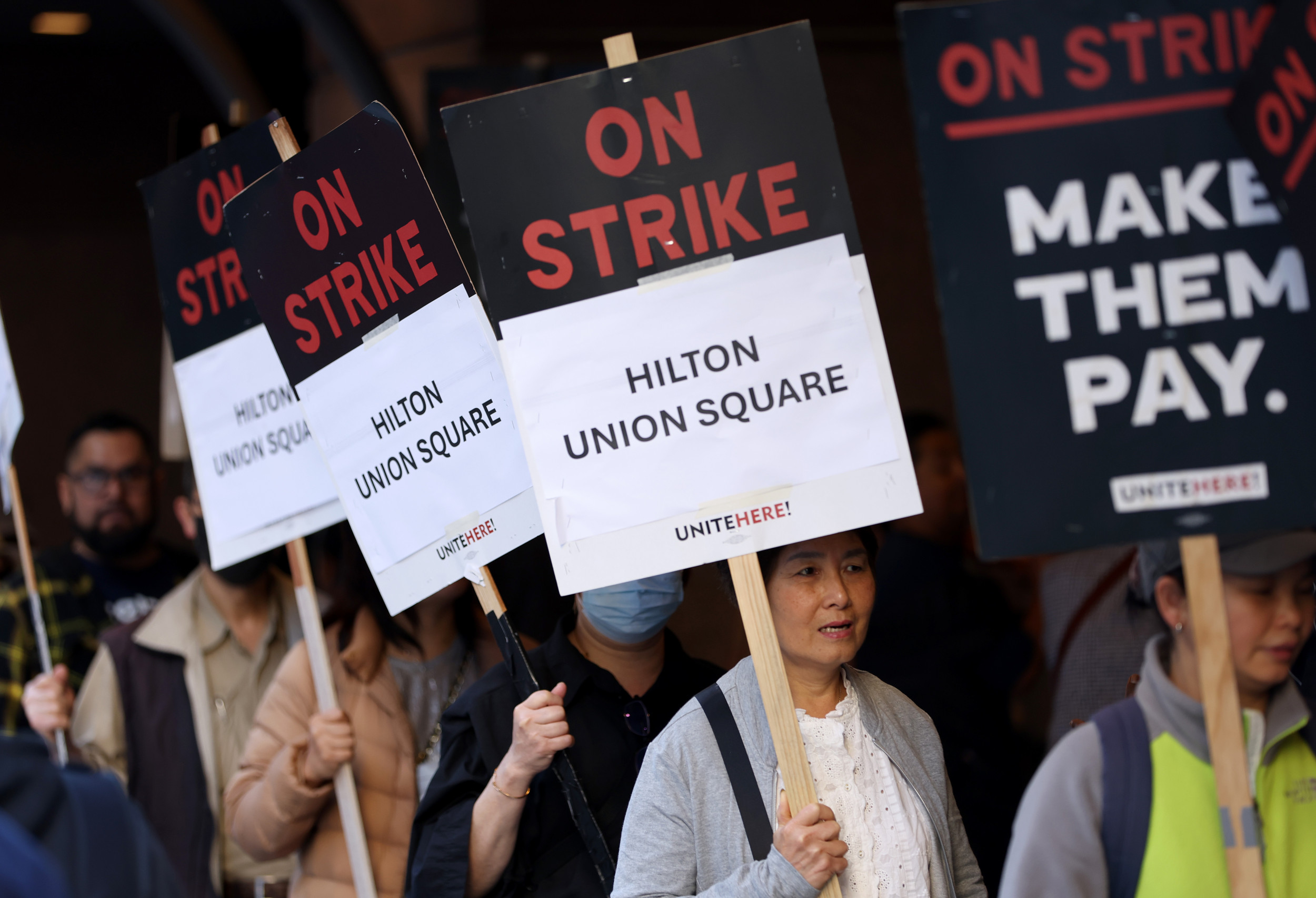Washington, D.C
Inflatable rat looms over Washington Post union employees picketing during strike – WTOP News
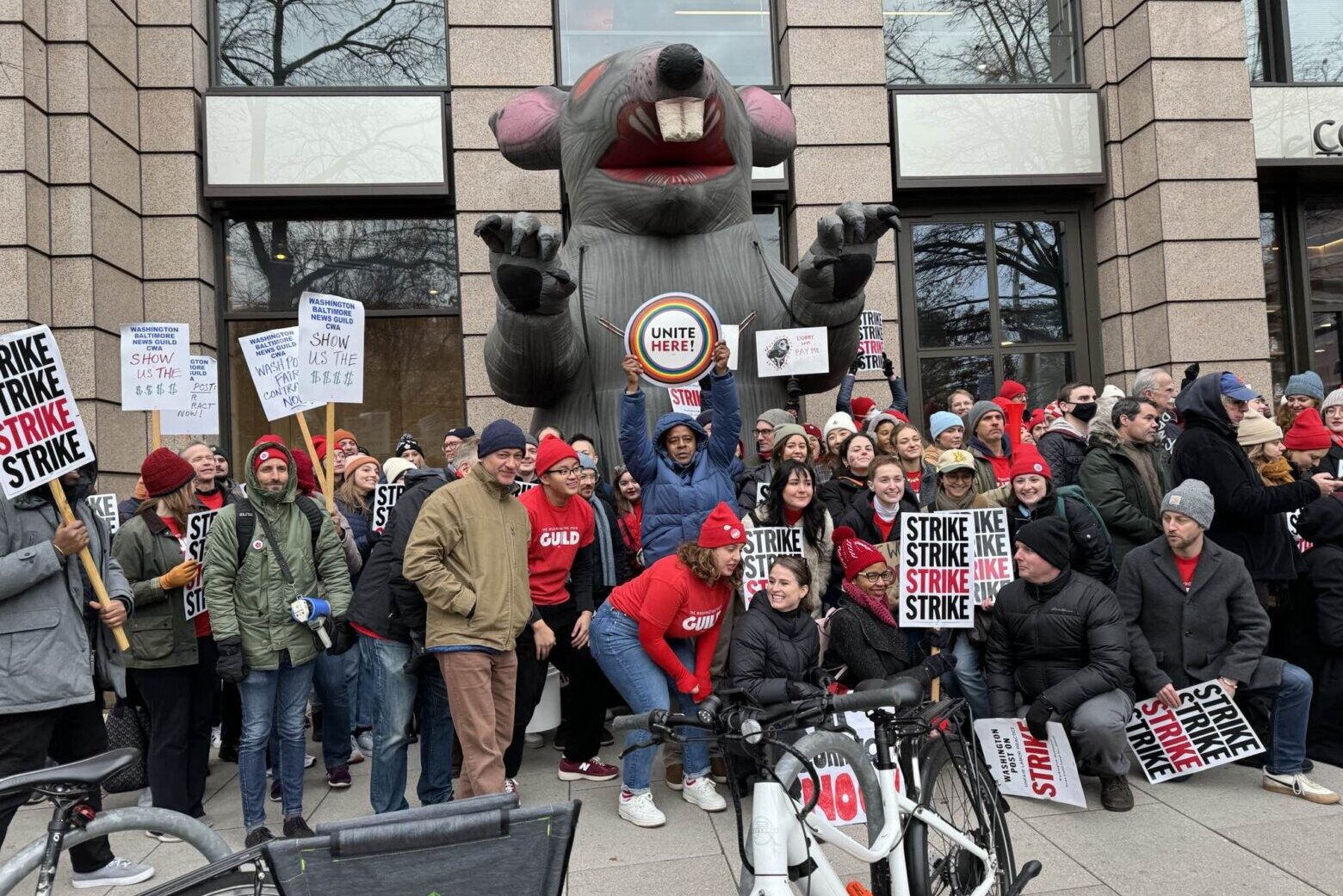
Hundreds of Washington Post employees were not reporting the news on Thursday, instead they were picketing the newspaper outside of its K Street offices in D.C.
This page contains a video which is being blocked by your ad blocker.
In order to view the video you must disable your ad blocker.
Hundreds of Washington Post employees were not reporting the news on Thursday. Instead, they were picketing the newspaper outside of its K Street offices in D.C.
It comes as members of the Washington Post Guild strike for 24 hours after months of negotiations with the paper continue to fall short.
Katie Mettler is a local criminal justice reporter for the Post. She said the paper has been negotiating with the union in “bad faith” and the one-day strike is meant to bring attention to that fact.
“We would all much rather be doing our jobs today, the work we care deeply about, serving the people we care deeply about, but unfortunately, we had to take this historic move,” Mettler said.
The union represents not only reporters, but also editors, cartoonists, visual journalists, advertising salespeople and circulation drivers.
As the union workers picketed under the shadow of a giant inflatable rat, called “Scabby,” they chanted: “What do we want? Fair pay. When do we want it? Yesterday.”
(WTOP/Mike Murillo)
WTOP/Mike Murillo
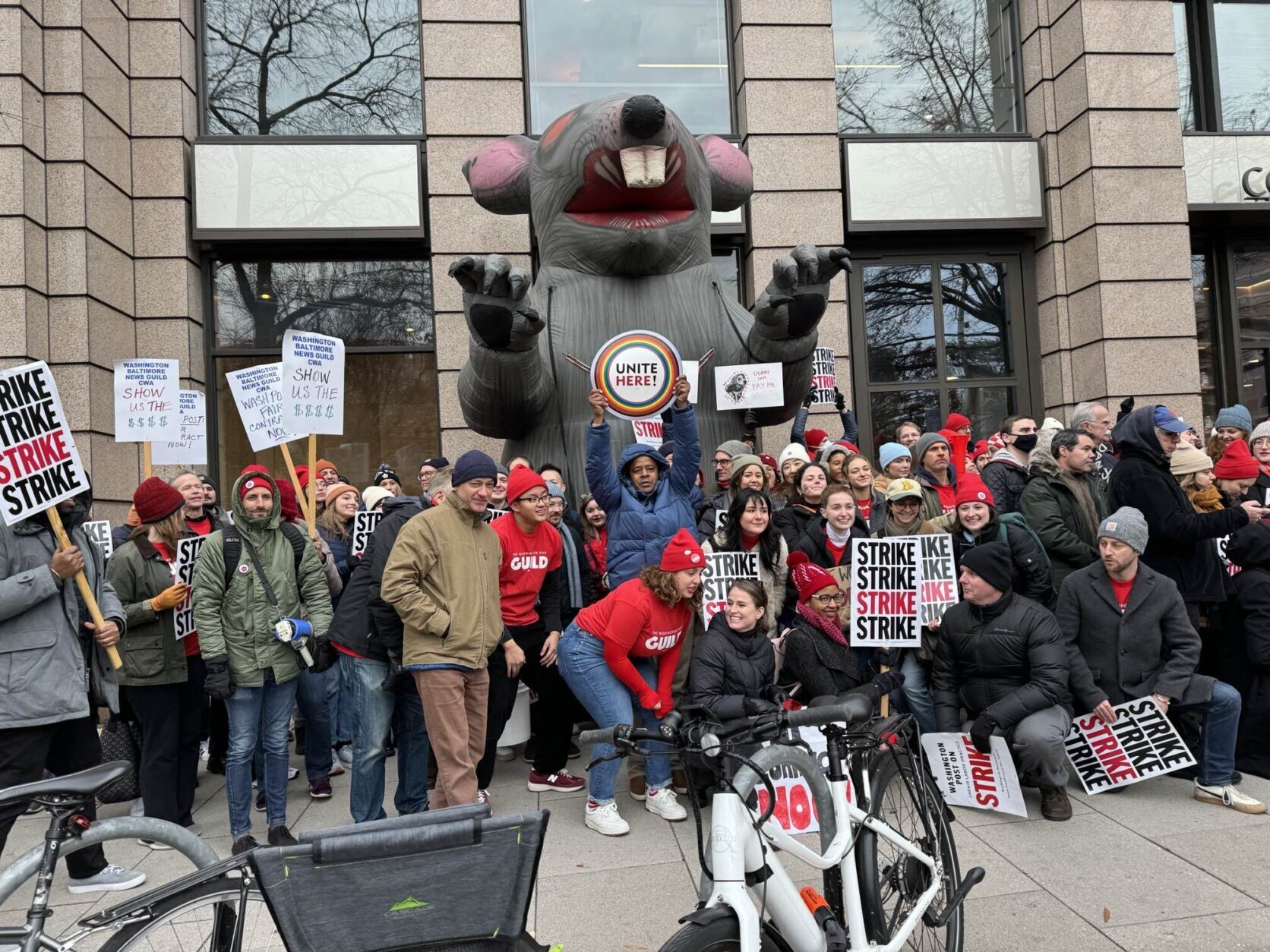
(WTOP/Mike Murillo)
WTOP/Mike Murillo
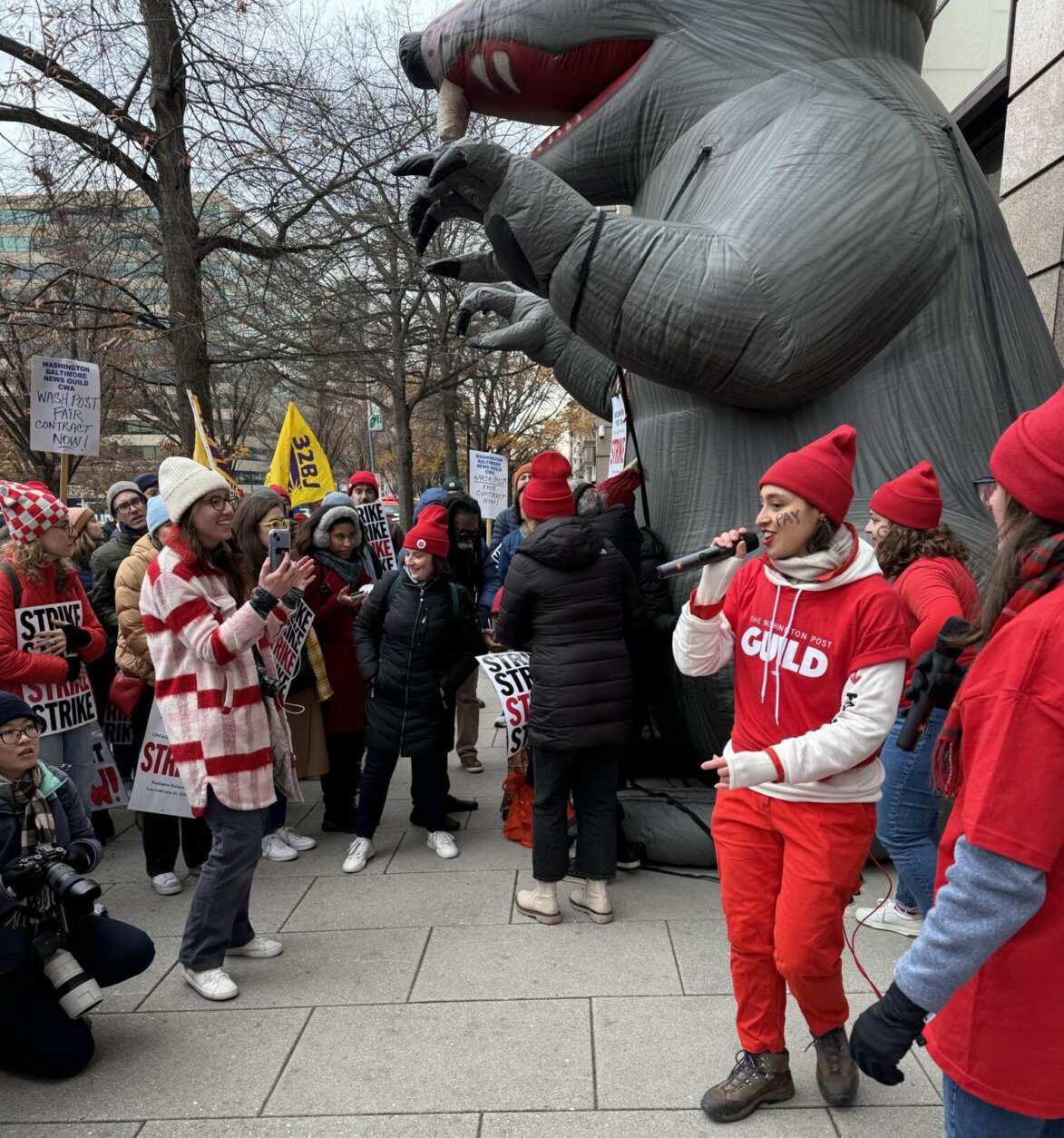
(WTOP/Mike Murillo)
WTOP/Mike Murillo
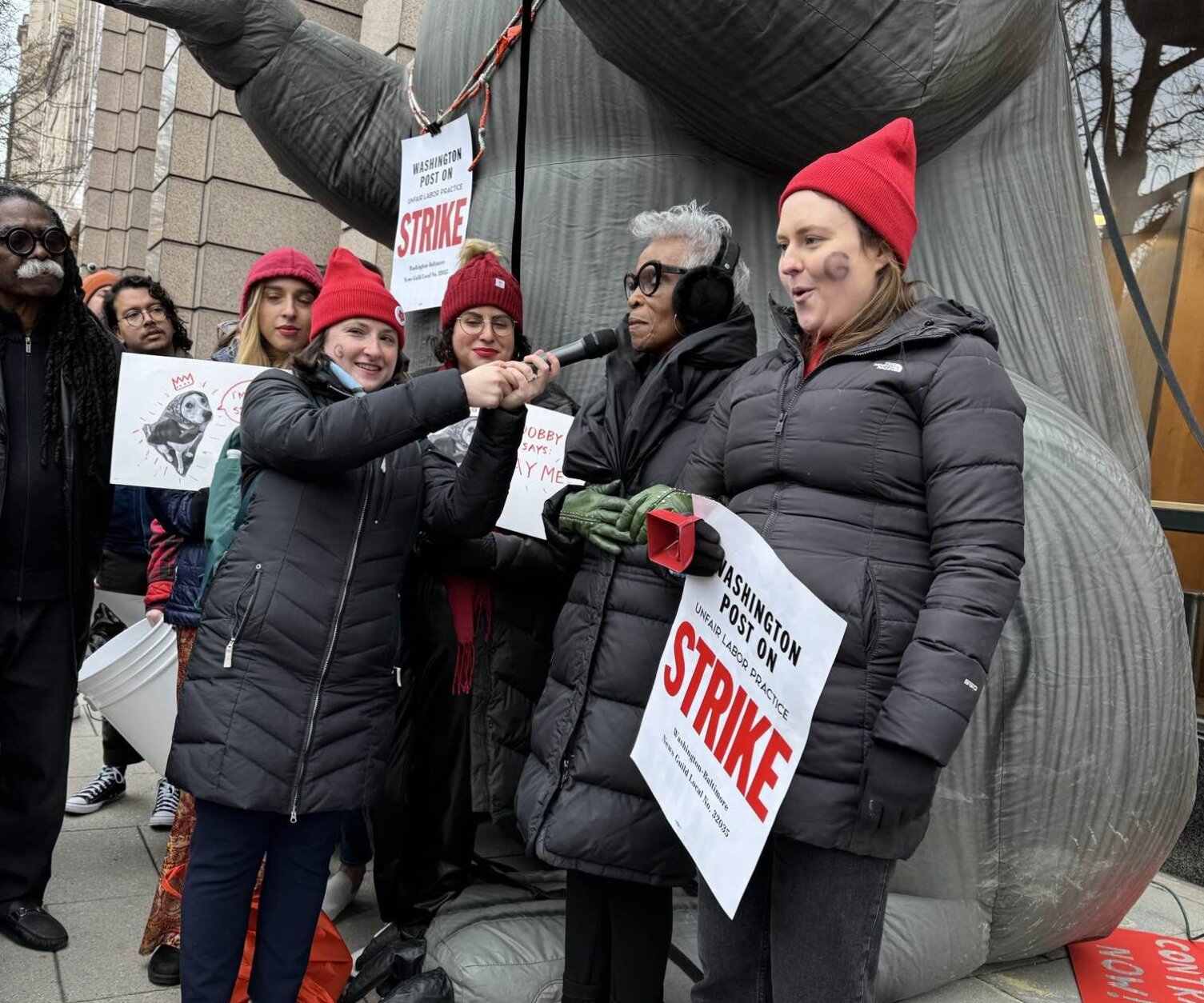
(WTOP/Mike Murillo)
WTOP/Mike Murillo
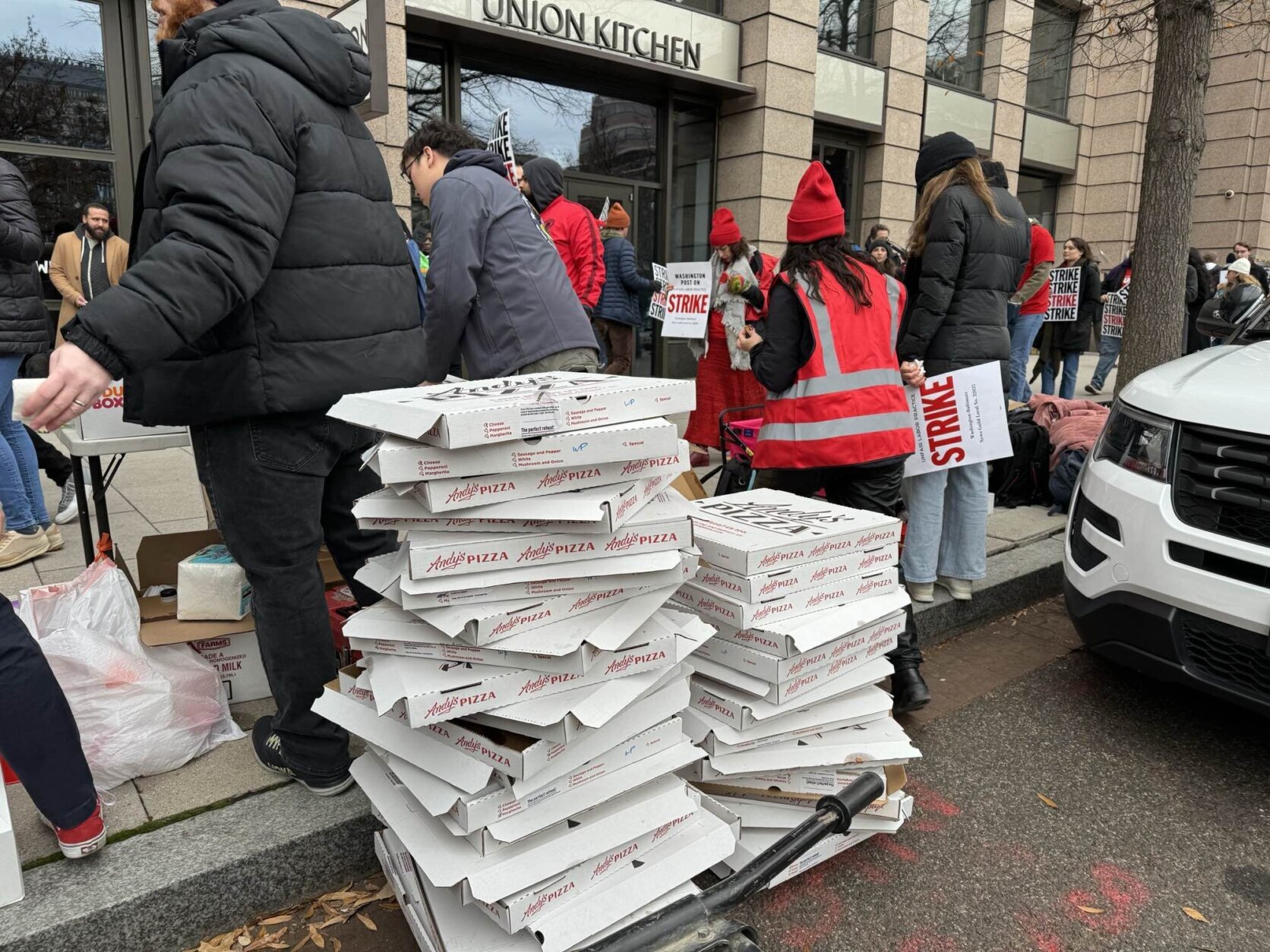
(WTOP/Mike Murillo)
WTOP/Mike Murillo
The Post is owned by billionaire Jeff Bezos and, in a statement to WTOP, the publication said it respects the rights of Guild-covered workers to engage in the strike.
“We will make sure our readers and customers are as unaffected as possible. The Post’s goal remains the same as it has from the start of our negotiations: to reach an agreement with the Guild that meets the needs of our employees and the needs of our business,” a Post spokesperson said.
The union members said this is also about saving jobs, after the claim the papers is threatening layoffs if enough people don’t take “voluntary buyouts” which were offered to more than 200 employees.
“The Post is our local newspaper here in D.C. and the fact that almost the entire local staff got offered a buyout is, frankly, what everyone should be appalled at,” said Zainab Mudallal, an opinion editor at the paper.
Mudallal called on the publication to provide more mental health services to employees as well.
“The fact that the Post is not willing to budge on any sort of mental health resources for their employees is a shame,” Mudallal said. “I really do believe that [if] we’re asked to be strong and for us to report and edit and do what we need to do as journalists, we need to be invested in as well.”
For Post climate reporter Sarah Kaplan, she said the minimum pay being offered to entry level employees, such as copy aides, is “atrocious” and that many cannot live in D.C. with the salaries offered.
She said the strike is meant to give the company an idea of what it would be like without the employees, which she said are “the heart and soul” of The Washington Post.
“The company is feeling what it means to be without these employees,” she said. “The Post is nothing without us and we deserve a fair deal.”
Among those braving the cold to support the Post employees was the paper’s first Black female reporter Dorothy Butler Gilliam.
The crowd erupted into cheers when Gilliam told them, “You will win!”

Washington, D.C
DC snow storm forecast: 5 to 10 inches of snow across DC, Maryland & Virginia

Winter snowstorm could bring 5-10 inches to DC region
A snowstorm is headed toward the D.C. region Sunday evening, bringing along 5-10 inches and a wintery weather mix. FOX 5 meteorologist Gwen Tolbart delivers the latest forecast.
WASHINGTON, D.C. – The Washington, D.C. region continues to brace for the first winter storm of 2025 with a significant snow threat from Sunday night into Monday.
When will the snow start on Sunday?
A sizable amount of snowfall is expected to roll in across the region, late Sunday night into Monday. The storm will start as snow early Monday, then possibly mix with sleet and freezing rain in the morning.
“We still remain in the early stages of this and developing. We could get a burst of snow, which would bring the numbers up, we could get more mix in there, warmer air, which could bring the numbers down,” Gwen Tolbart said.
How much snow could we get on Monday?
The latest forecast shows a widespread five to ten inches of snow possible across much of the D.C. region, with locally more possible. Areas south of D.C. will have a better chance of a mix of snow, sleet, and freezing rain.
Temperatures are expected to remain in the low 30s and 20s. The wind chill across the D.C. region is looming in the 10s.
According to the FOX 5 Weather Team, heavy snow is expected Monday morning which will drastically impact traffic and travel.
Latest weather updates on FOX Local. Check for updated school closings and delays.
Stay with the FOX 5 Weather Team for the latest forecast updates and check the updated list of closings and delays. The FOX LOCAL app is your source for live FOX 5 DC weather updates. Click here to download.
Stay warm and prepared for the winter weather ahead!
MORE COVERAGE:
DC winter snow storm: Timing, how much to expect by Monday
DC winter snow storm: 1-2 punch expected to bring snow, sleet to DMV
Snow threat prompts early dismissals: DC, Maryland, Virginia closures & delays
DMV snow forecast: Winter preparedness on the road
The Source: The National Weather Service and FOX 5 reporting contributed to this article.
Washington, D.C
5 injured in Washington DC shooting after 'dispute between known parties'

Five people were injured in a shooting in Washington DC following a “dispute between known parties”, police said. The injured included four men and a woman.
The incident occurred in the 1500 block of Harry Thomas Way NE. Preliminary investigation by police said four people – three men and a woman – were found “conscious and breathing” and rushed to a hospital.
“Shooting investigation in the 1500 block of Harry Thomas Way NE. Preliminary: Adult male and adult female located at the scene, transported conscious and breathing. Two additional adult males arrived at a hospital, both conscious and breathing,” Washington DC Police Department wrote on X.
Police said a fifth patient, a male, was also injured in the incident. “Preliminarily, this shooting stemmed from a dispute between known parties,” police added.
The shooting came three days after the US was rocked by three attacks on New Year’s Day.
A suspect, Shamsud-Din Jabbar, 42, a US Army veteran, rammed a crowd in New Orleans with a truck and then opened fire at people, killing 15 and injuring at least 30 others. He was subsequently killed in a shootout with police after the incident.
Hours after the New Orleans attack, Matthew Livelsberger, a 37-year-old Armyman, died after he blew up a Tesla Cybertruck outside the Trump International Hotel in Las Vegas. Police said Livelsberger died from a self-inflicting gun wound.
In a third incident, at least 11 people were injured in a mass shooting at a nightclub in Queens in New York City.
Washington, D.C
Heightened security, road closures in DC for Jan. 6 vote counting, Carter funeral

Expect to see more police officers and road closures in Washington, D.C., over the next few days as the city prepares for the certification of the presidential election at the Capitol and the state funeral for former President Jimmy Carter.
“I want to be very clear that we will not tolerate any violence, rioting, destruction of property or any behavior that threatens the safety and security of our city,” Metropolitan Police Department Chief Pamela Smith said at a news conference D.C. authorities held Friday.
Fencing is up around the U.S. Capitol and will remain in place until the inauguration on Jan. 20.
While officials say there are no credible threats, security will be high next week given the deadly terrorist attack in New Orleans and the car explosion in Las Vegas.
Road closures around the Capitol building are in effect Friday night through Monday for the counting and certification of electoral votes taking place Monday.
Closures will then expand down Pennsylvania Avenue on Tuesday for the motorcade carrying Carter from Join Base Andrews to the U.S Navy Memorial. Then, a public procession will take Carter from the memorial to the Capitol Tuesday afternoon.
Drivers should expect widespread road closures on Thursday for Carter’s funeral, especially surrounding the Washington National Cathedral in Northwest.
Security will also be enhanced above the city.
“I advise everyone that the Secret Service will use drones as part of our comprehensive security plan. Do not be alarmed if you see these assets during the upcoming events or training in the days ahead,” said William McCool, the special agent in charge for the U.S. Secret Service Washington Field Office.
While authorities said there’s no known threat, they are concerned about the potential for a lone wolf attack. A suspect who planted two pipe bombs near the Capitol on Jan. 6, 2021. That person was never caught.
“We’re absolutely concerned that person is still on the loose and at large. Those were two viable devices left, not only outside of the Democratic and Republican National Committee headquarters, but in a neighborhood where people work and live and we have had a consistent effort alongside our partners to try to identify that person. That is going to remain a threat until we can identify that person,” said David Sundberg, assistant director in charge for the FBI Washington Field Office.
Road Closures
The following roads will close at about 8 p.m. on Friday:
- First Street between Constitution Avenue, NW, and Independence Avenue, SW
- Pennsylvania Avenue between 3rd Street, NW, and First Street, NW
- Maryland Avenue between 3rd Street, SW, and First Street, SW
These roads are closed starting 7 a.m. Monday:
- First Street between Constitution Avenue, NE, and Independence Avenue, SE
- East Capitol Street between First Street and 2nd Street
- Constitution Avenue between Louisiana Avenue, NW, and 2nd Street, NE
- Independence Avenue between Washington Avenue, SW, and 2nd Street, SE
- D Street between First Street, NE, and 2nd Street, NE
- Maryland Avenue between First Street, NE, and Constitution Avenue, NE
- First Street between Louisiana Avenue, NW, and Constitution Avenue, NW
The following streets will be closed to vehicle traffic from 7 p.m. Monday through Wednesday at 4:30 a.m.:
- 13th Street from E Street to Pennsylvania Avenue, NW
- 12th Street from E Street to Independence Avenue, SW
- 11th Street from E Street to Constitution Avenue, NW
- 10th Street from E Street to Constitution Avenue, NW
- 9th Street from E Street to Constitution Avenue, NW
- 8th Street from E Street to D Street, NW
- 7th Street from E Street, NW to Independence Avenue, SW
- 6th Street from E Street to Constitution Avenue, NW
- 5th Street from E Street to D Street, NW
- 4th Street from D Street, NW to Independence Avenue, SW
- 3rd Street from E Street, NW to Independence Avenue, SW
- Northbound 3rd Street Tunnel Exit 9 toward US Capitol
- 2nd Street from C Street to Constitution Avenue, NW
- 1st Street from E Street, NW to Maryland Avenue, SW
- New Jersey Avenue from E Street to Constitution Avenue, NW
- Louisiana Avenue from Columbus Circle, NE to Constitution Avenue, NW
- Delaware Avenue from Columbus Circle to Constitution Avenue, NE
- North Capitol Street from E Street to D Street, NW
- 1st Street from Columbus Circle, NE to Independence Avenue, SE
- D Street from 9th Street NW to 2nd Street, NE
- Indiana Avenue from 7th Street to 3rd Street, NW
- C Street from 6th Street to New Jersey Avenue, NW
- Pennsylvania Avenue from 14th Street to 1st Street, NW
- Constitution Avenue from 14th Street NW to 2nd Street, NE
- Madison Drive from 14th Street to 3rd Street, NW
- Jefferson Drive from 14th Street to 3rd Street, SW
- Maryland Avenue from Independence Avenue to 1st Street, SW
The following streets will close on Tuesday from 7 a.m. to 3 p.m.:
- Independence Avenue from Washington Avenue, SW to 2nd Street, SE
The following streets will close on Tuesday from 1 to 3 p.m.:
- 8th Street from F Street to E Street, NW
- F Street from 9th Street to 7th Street, NW
- E Street 10th Street to 6th Street, NW
The following street will be closed intermediately on Thursday from 4 a.m. to 3 p.m.:
- Calvert Street from 29th Street to Connecticut Avenue, NW
The following streets will be closed on Thursday from 12:01 a.m. to 3 p.m.:
- Garfield Street from Massachusetts Avenue, NW to 34th Street, NW
- 34th Street from Woodley Road to Garfield Street, NW
- Woodley Road from Wisconsin Avenue to 34th Street, NW
- Wisconsin Avenue from Lowell Street to Massachusetts Avenue, NW
- Cathedral Avenue from Massachusetts Avenue to Wisconsin Avenue, NW
The following streets will be open for local traffic only on Thursday from 12:01 a.m. to 3 p.m.:
- Garfield Street from 34th Street to 32nd Street, NW
- Woodland Drive from Garfield Street to 32nd Street, NW
- 33rd Place from Cathedral Avenue to Garfield Street, NW
- Cleveland Avenue from 34th Street to 32nd Street, NW
- Cathedral Avenue from 34th Street to 32nd Street, NW
- Klingle Road from 34th Street to 32nd Street, NW
- Woodley Road from 33th Street to 32nd Street, NW
- 34th Street from Macomb Street to Woodley Road, NW
- 35th Street from Lowell Street to Woodley Road, NW
- 36th Street from Lowell Street to Woodley Road, NW
- Wisconsin Avenue from Macomb Street, NW to Lowell Street, NW
- Woodley Road from 38th Street to Wisconsin Avenue, NW
- 36th Street from Garfield Street to Massachusetts Avenue, NW
- 35th Street from Garfield Street to Fulton Street, NW
- 34th Place from Garfield Street to Fulton Street, NW
- 34th Street from Garfield Street to Fulton Street, NW
Parking restrictions
The following streets will be posted as Emergency No Parking from Saturday at 12:01 a.m. through Wednesday at 4:30 a.m.:
- 13th Street from E Street to Pennsylvania Avenue, NW
- 12th Street from E Street to Madison Drive, NW
- 11th Street from E Street to Pennsylvania Avenue, NW
- 10th Street from E Street to Constitution Avenue, NW
- 9th Street from E Street to Constitution Avenue, NW
- 8th Street from F Street to D Street, NW
- 7th Street from E Street, NW to Independence Avenue, SW
- 6th Street from E Street to Constitution Avenue, NW
- 5th Street from E Street to D Street, NW
- 4th Street from E Street, NW to Independence Avenue, SW
- 3rd Street from E Street, NW to Independence Avenue, SW
- 2nd Street from C Street to Constitution Avenue, NW
- 1st Street from E Street to Pennsylvania Avenue, NW
- New Jersey Avenue from E Street to Constitution Avenue, NW
- Louisiana Avenue from Columbus Circle, NE to Constitution Avenue, NW
- Delaware Avenue from Columbus Circle to Constitution Avenue, NE
- North Capitol Street from E Street to D Street, NW
- 1st Street from Columbus Circle, NE to Independence Avenue, SE
- F Street from 9th Street to 7th Street, NW
- E Street 10th Street, NW 6th Street, NW
- D Street from 9th Street NW to 1st Street, NE
- Indiana Avenue from 7th Street to 3rd Street, NW
- C Street from 6th Street to New Jersey Avenue, NW
- Pennsylvania Avenue from 14th Street to 1st Street, NW
- Constitution Avenue from 14th Street NW to 2nd Street, NE
- Madison Drive from 14th Street to 3rd Street, NW
- Jefferson Drive from 14th Street to 3rd Street, SW
- Maryland Avenue from Independence Avenue to 1st Street, SW
- Independence Avenue from Washington Avenue, SW to 2nd Street, SE
The following streets will be posted as Emergency No Parking on Thursday from 4 a.m. to 3 p.m.:
- Calvert Street from 28th Street to Shoreham Drive, NW
-

 Health7 days ago
Health7 days agoNew Year life lessons from country star: 'Never forget where you came from'
-
/cdn.vox-cdn.com/uploads/chorus_asset/file/24982514/Quest_3_dock.jpg)
/cdn.vox-cdn.com/uploads/chorus_asset/file/24982514/Quest_3_dock.jpg) Technology7 days ago
Technology7 days agoMeta’s ‘software update issue’ has been breaking Quest headsets for weeks
-

 Business4 days ago
Business4 days agoThese are the top 7 issues facing the struggling restaurant industry in 2025
-

 Politics1 week ago
Politics1 week ago'Politics is bad for business.' Why Disney's Bob Iger is trying to avoid hot buttons
-

 Culture4 days ago
Culture4 days agoThe 25 worst losses in college football history, including Baylor’s 2024 entry at Colorado
-

 Sports3 days ago
Sports3 days agoThe top out-of-contract players available as free transfers: Kimmich, De Bruyne, Van Dijk…
-

 Politics2 days ago
Politics2 days agoNew Orleans attacker had 'remote detonator' for explosives in French Quarter, Biden says
-

 Politics2 days ago
Politics2 days agoCarter's judicial picks reshaped the federal bench across the country


